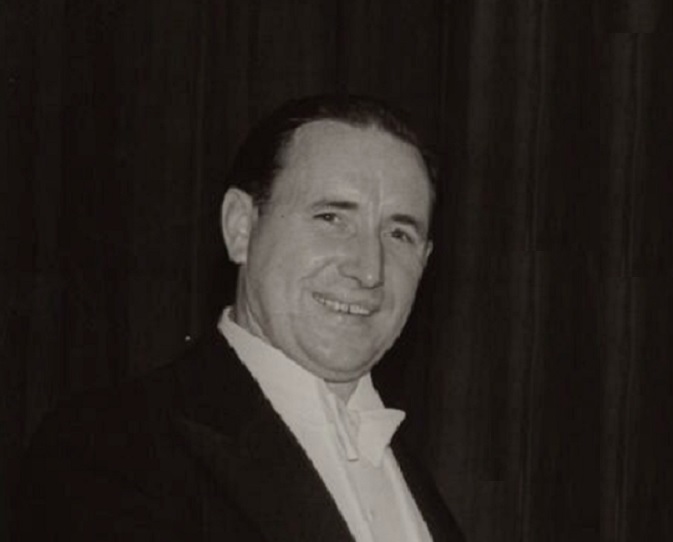19: Rowland Jones (1912 – 1978)
To gain fame in one field of musical endeavour is an achievement in itself – but to secure acclaim in two is the reserve of performers borne of a rare and very special talent.
One such was Rowland Jones – a Welshman whose innate musicianship blessed both the brass band and operatic worlds.
Born in 1912, Enoch Rowland Jones hailed from the small south-west Wales village of Gwaun-Cae-Gurwen.
Coal was its economic driving force; the village perched between seven or so anthracite pits in the district - a strong, Welsh speaking community from which emerged a remarkable brass band that still competes today.
In the 1920’s they were the pre-eminent band in Wales; first appearing at the National Finals at Crystal Palace in 1911 and claiming top-six finishes at the September British Open from 1921 to 1924.
Musical family
The Jones family was a musical one; strongly committed to the local chapel and eisteddfod, with Rowland (who had two sisters) encouraged to join the Gwaun-Cae-Gurwen Silver Band by his uncle, Dan Lloyd, the conductor.
Learning through imitation rather than tuition highlighted his natural affinity with pitch and phrasing (something that marked his operatic performances in later years), his timbre on euphonium strong, lyrical and confident.
Learning through imitation rather than tuition highlighted his natural affinity with pitch and phrasing (something that marked his operatic performances in later years), his timbre on euphonium strong, lyrical and confident.
His father was also aware that a working life underground cursed by the damaging inhalation of coal dust would be detrimental to his further development and managed to secure him employment as a colliery engine driver.
Soon his reputation grew and was noted in banding fields far from the south Wales valleys – especially at Crystal Palace, where he made his debut with Gwaun-Cae-Gurwen in 1925. Although they did not feature in the prizes, the ‘northern’ scouts were well-aware of his individual excellence.
Prised away
One of them was the legendary Arthur O. Pearce of Black Dyke. In March 1934, with the mining industry suffering in the teeth of recession, Pearce trekked deep into Wales to prise the rising euphonium star away to Queensbury.
Not a man easily impressed, Pearce found Rowland to be a remarkable ‘natural’ musician of confident poise and engaging humility.
The audition was a formality and he became the Black Dyke Mill ‘gasman’ – a job that entailed visiting all the mill houses owned by the John Foster company.
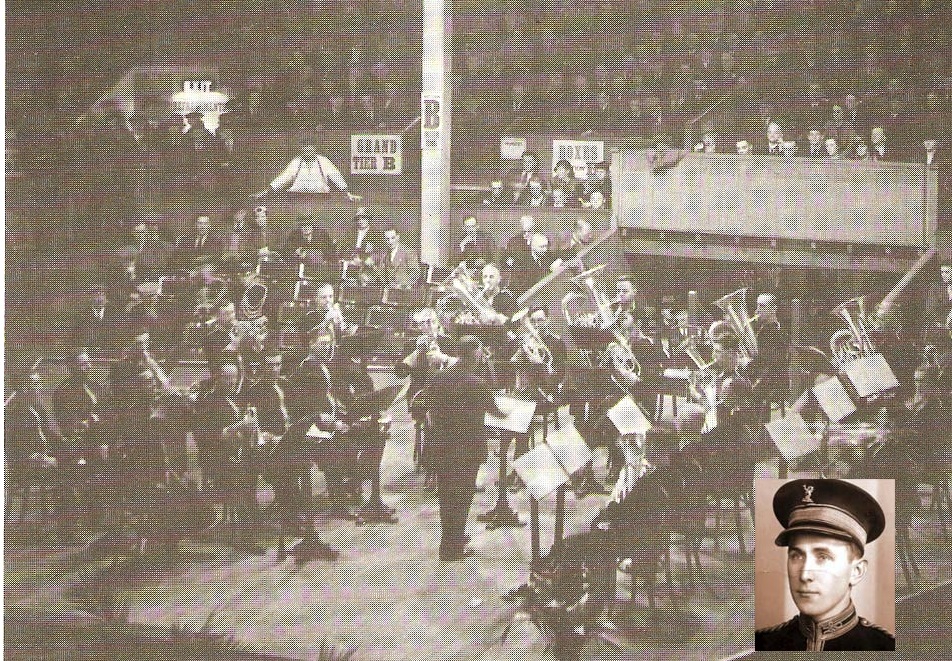
Rowland Jones was part of the Black Dyke Band that won the 1935 British Open
With his welcoming demeanour, ready smile and strong sense of community, he became an immensely popular figure in the local Queensbury area, taking his time on his rounds by reciprocating kind gestures of cups of tea by singing popular songs to elderly tenants.
So too with the band.
Following his customary solo spot in a concert Pearce allowed him to sing his encore – well known ballads such as ‘The English Rose’ by German and Gheel’s, ‘For You Alone’.
Suited to perfection
When Black Dyke played at Reading in July 1937, the correspondent of ‘The Reading Standard’ noted his ‘pleasant tenor voice’, which ‘was suited to perfection by the songs ‘Smilin’ Through’ and ‘Brown Bird’.
A year later A.B. Austin, of the national ‘Daily Herald’ heard Black Dyke in Hyde Park in London, where he noted that a member of the audience called, “Old Mr Halliwell” had risen to his feet, “pressed his bowler hat firmly on his head and clapped loudly, roused by the performance by a gas inspector singing ‘Macushla’.”
Interestingly, just a week earlier Black Dyke had appeared in Derby conducted by a certain William Halliwell, due to illness to A.O. Pearce. Was the bowler hatted ‘fan’ the same person you wonder?
A year later A.B. Austin, of the national ‘Daily Herald’ heard Black Dyke in Hyde Park in London, where he noted that a member of the audience called, “Old Mr Halliwell” had risen to his feet, “pressed his bowler hat firmly on his head and clapped loudly, roused by the performance by a gas inspector singing ‘Macushla’.”
If he was, then he wasn’t alone – for the Welshman was heard almost on a weekly basis on radio broadcasts (and especially later during the War years with Bickershaw Colliery).
However, if concert performances of note were commonplace, major contest success was rather more elusive for Black Dyke during Rowland’s tenure as solo euphonium. Up against the formidable Foden’s at Crystal Palace the solitary triumph came at Belle Vue in 1935 on ‘Northern Rhapsody’.
In the same year Rowland also took to the contest stage at the Bingley Music Festival where he was placed second in the ‘Operatic Solo Class’.
Bickershaw Colliery
He stayed with Black Dyke until March 1939 – prised back to the mining industry by the offer from the ambitious Bickershaw Colliery Band in Wigan, and in part by the protected war footing status of the employment and the additional money for playing in the band.
Under the twin forces of Managing Director Lt Col Ernest Hart and conductor William Haydock Bickershaw enjoyed a short, intensive period of success.
Rowland was given work in the pay office, staying eight years during which time he combined banding with Home Guard duties, entertaining troops in concerts and taking singing lessons with the operatic tenor Thomas Burke, who was himself a former cornet player.
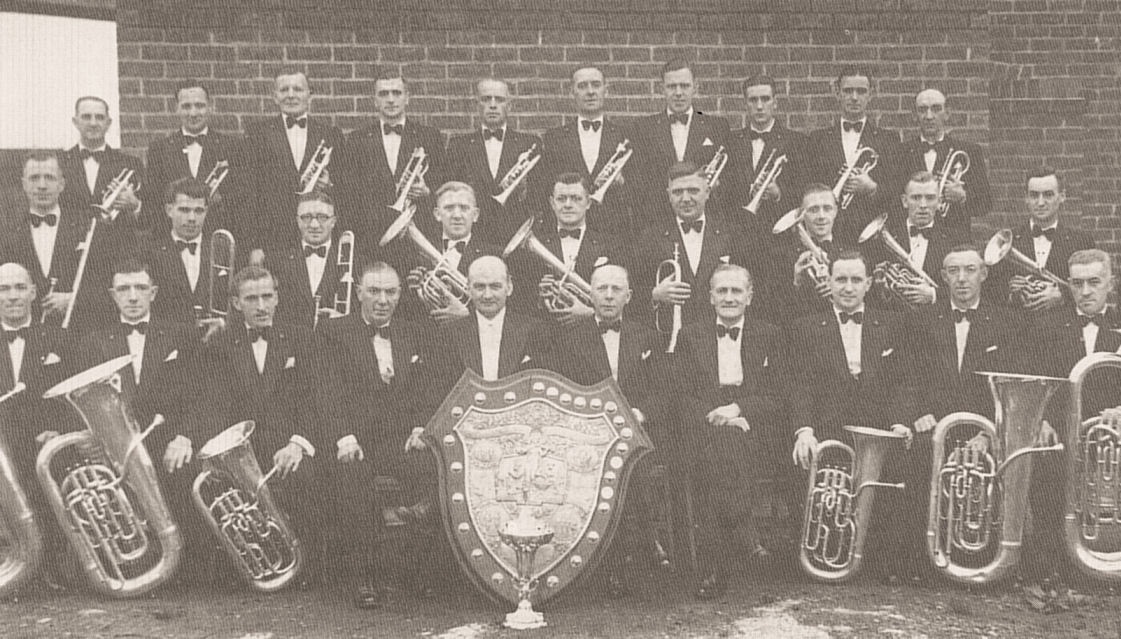
Rowland Jones was a member of three British Open winning performances with Bickershaw Colliery
In a neat twist of coincidence, Rowland Jones went on to make his name in the role of Rodolfo in ‘La Boheme’ – one that Burke had made his name with just after the First World War.
The Bickershaw years gave not only security but success – the band winning the British Open in 1940, 1943 and 1946 – the latter on ‘Salute to Freedom’ by Eric Ball, which was to be the crowning glory of his euphonium career.
With the composer’s foreword to the score stating: “Quietly, wistfully, even with misgiving Man steps upward to claim his hard won freedom”, Rowland opened with such lyrical beauty that the title was won almost on his shoulders.
With the composer’s foreword to the score stating: “Quietly, wistfully, even with misgiving Man steps upward to claim his hard won freedom”, Rowland opened with such lyrical beauty that the title was won almost on his shoulders.
It was a wonderful swan-song (although there was an encore to come). Perhaps he knew as much too.
Professional debut
In July 1946 he had auditioned for a position at Sadler’s Wells Opera Company and made his professional debut later the same year as 'Turrido' in Mascagni's ‘Cavalleria Rusticana’.
In 1947 he made his last competitive appearance at the Open (Bickershaw came fifth) as something as personal thank-you to Ernest Hart.
Nationalisation soon brought the reality of ‘colliery banding’ into a new light. Retainers ended and so did the band. Hart committed suicide in 1950.
Impeccable
By then his operatic career was established (although he ensured he supplemented his income by owning a sweet shop); his rich, tender voice, impeccable phrasing and clear enunciation ideal for roles such as Jenik in Smetana’s ‘Bartered Bride’ and Lensky in ‘Yevgeny Onegin’, whilst his sleekly brylcreamed hair and dark eyes gave an intensity of character that he played to the full - from Lt Pinkerton in ‘Madam Butterfly’ to John Styx in ‘Opheus in the Underworld’.
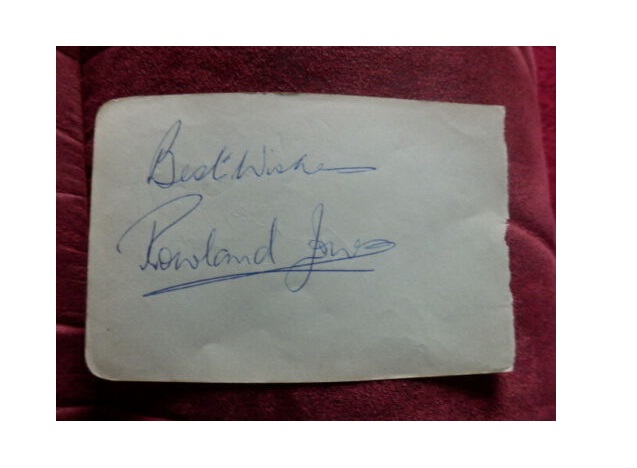
The autograph of the Welsh star is still sought after today by opera fans
In 1951 his reputation was enhanced playing Boris in the UK premiere of Janacek's ‘Kat'a Kabanova’ and he soon became a popular household name on radio and television in programmes such as ‘Come to the Opera’ alongside Elizabeth Schwarzkopf, ‘Those Wonderful Shows’ with Dora Bryan and Peter Graves and in solo recital performances with pianist Ernest Lush.
He also appeared in that year’s Promenade Concert series from the Royal Albert Hall with the London Philharmonic Orchestra.
Banding link
And whilst as a principal artist at Sadler’s Wells he sang with many of the greatest names in the operatic world such as Joan Sutherland, Janet Baker, Geraint Evans and Owen Brannigan (the latter in a 1958 programme produced for the BBC by Geoffrey Brand), he did not completely lose his connection to the banding world.
And whilst as a principal artist at Sadler’s Wells he sang with many of the greatest names in the operatic world such as Joan Sutherland, Janet Baker, Geraint Evans and Owen Brannigan (the latter in a 1958 programme produced for the BBC by Geoffrey Brand), he did not completely lose his connection to the banding world.
In 1948 he performed with Munn & Felton’s on a radio broadcast, as well as the National Brass Band of Wales at the 1957 National Eisteddfod and CWS (Manchester) in 1958.
It perhaps says something of the regard he was held that he also appeared in a special broadcast in November 1948 marking the 200th radio broadcast of Black Dyke Mills Band – conducted by the man who brought him to Queensbury, A.O. Pearce.
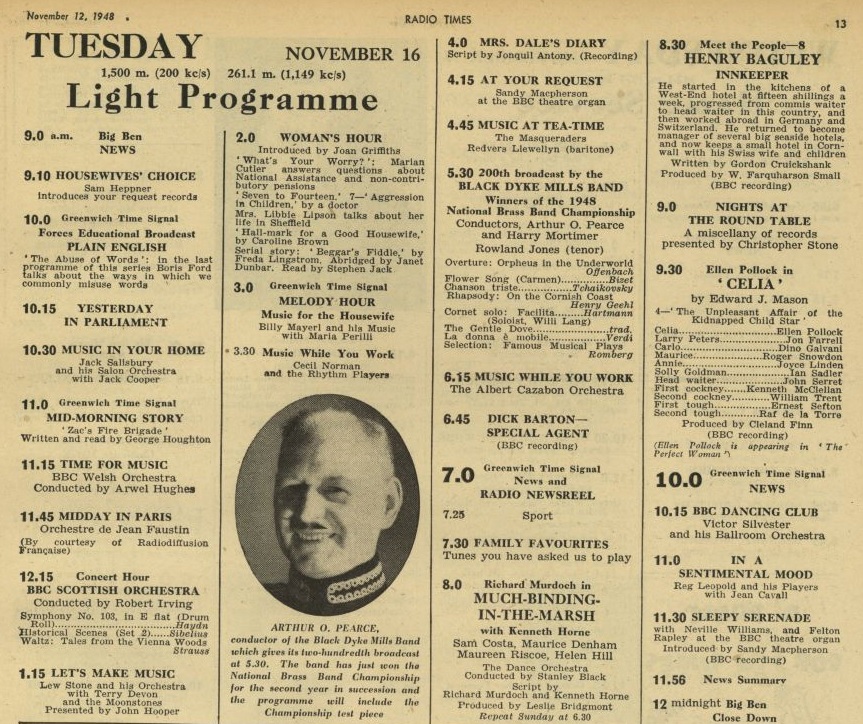
Rowland Jones continued to perform with brass bands - including Black Dyke on their 200th radio broadcast
Acclaim
Even years later he was drawn back: His friend Geoffrey Whitham once persuading him to sing in a concert with Hammonds Sauce Band – the friendly agreement also seeing the two great players (long since retired) pick up borrowed euphoniums for a performance of Drigo’s ‘Serenade’.
Rowland Jones left Sadler’s Wells after 12 years and went on to perform at Covent Garden – his role as Alfred in ‘Die Fledermaus’ gaining widespread critical as well as popular acclaim – subtly refined and characterised even in comic effect.
In 1969 he sang at the Investiture Ceremony of The Prince of Wales at Caernarvon Castle – an event broadcast across the globe and he returned to his homeland on numerous occasions to perform.
All the while it was said that he kept his old mouthpiece in his pocket just in case he fancied a return to his banding roots if the chance arose.
He is fondly remembered as part of the comedy show ‘Welsh Rarebit’ and as part of St David Day celebration events alongside The Goons of Harry Secombe, Peter Sellers and Spike Milligan to broadcasts with Male Voice and Children’s Choirs.
Debt of gratitude
Rowland Jones wore his musical celebrity with ease and never forgot the debt of gratitude he owed to others – notably his parents and those who encouraged his talent. He was a devoted husband to his wife, Roseann who he met in a pub in 1941 and married the same year. They had two children.
In later years he worked on a freelance basis – choosing roles carefully, yet still enabling him to maintain a high profile with the public. He also taught and mentored at the Guildhall School of Music.
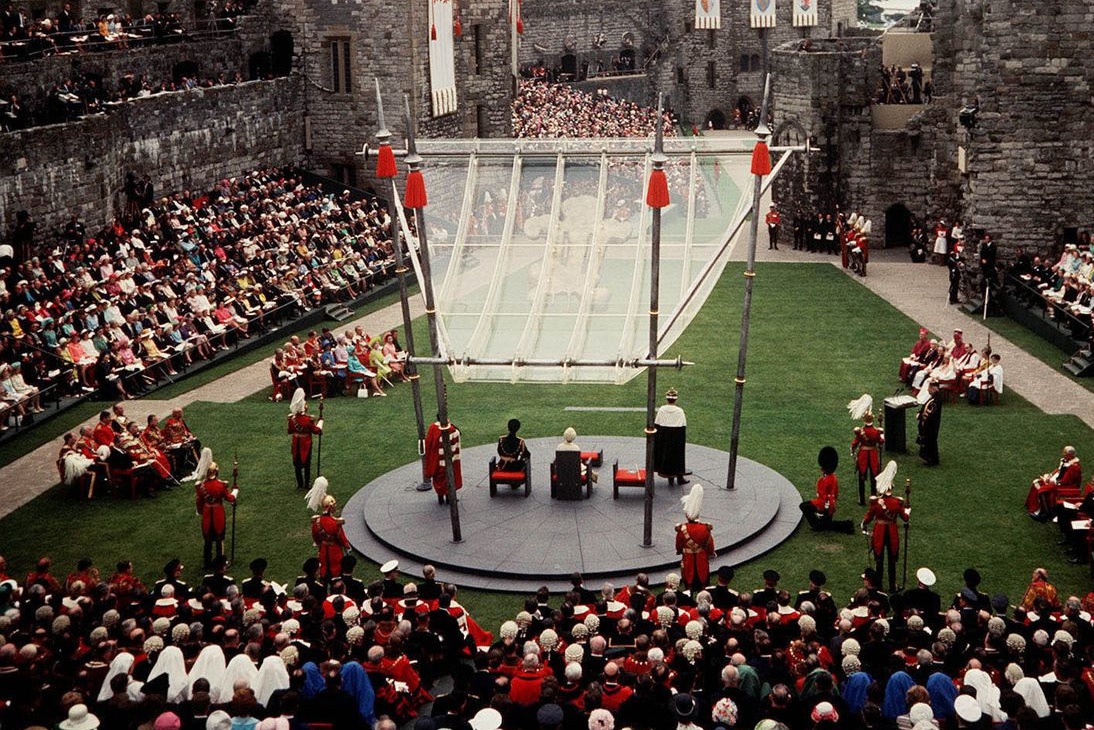
Rowland Jones performed at the 1969 Investiture at Caernavon Castle
One of his last performances in was in 1976 in the oratorio 'Elijah' performed close to his boyhood home for the Brynaman Old Age Pensioners - just two years before his death from cancer.
All the while it was said that he kept his old mouthpiece in his pocket just in case he fancied a return to his banding roots if the chance arose.
Warm tributes
Rowland Jones, a wonderful musician who graced both the brass band and operatic worlds with his talent, died aged 66 on 28th August 1978. He was buried in Old Carmel Cemetery in his home village of Gwaun-Cae-Gurwen.
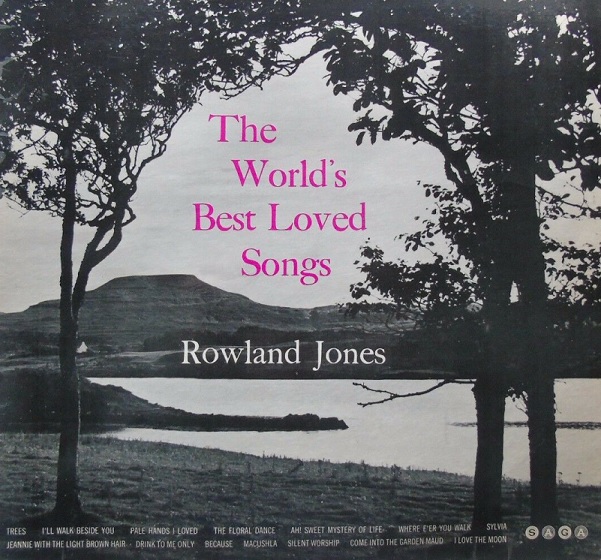
An LP recording made in the early 1970s
And whilst his passing elicited warm tributes in the operatic and choral worlds (there is a prize awarded in his name at the National Eisteddfod), it was not particularly noted in the banding press.
A week later came one small entry in British Bandsman followed by a single letter from the euphonium player Barrie Perrins who said: “His beautiful tone, lyrical style and overall artistry were qualities I will remember – they exemplified brass playing at its very best.”
Those who heard him would not have disagreed.
Tim Mutum
With thanks to noted references to research and articles by Chris Helme and Trevor Herbert
4BR Hall of Fame: No.1: Jack Atherton
https://www.4barsrest.com/articles/2019/1832.asp
4BR Hall of Fame: No.2: Albert Baile
https://www.4barsrest.com/articles/2019/1836.asp
4BR Hall of Fame: No.3: Stanley Boddington
https://www.4barsrest.com/articles/2019/1842.asp
4BR Hall of Fame: No.4: Bram Gay
https://www.4barsrest.com/articles/2020/1848.asp
4BR Hall of Fame: No.5: Leonard Lamb
https://www.4barsrest.com/articles/2020/1855.asp
4BR Hall of Fame: No.6: Arthur Stender
https://www.4barsrest.com/articles/2020/1866.asp
4BR Hall of Fame: No.7: Violet Brand
https://www.4barsrest.com/articles/2020/1871.asp
4BR Hall of Fame: No.8: Eric Bravington
https://www.4barsrest.com/articles/2020/1875.asp
4BR Hall of Fame: No.9: Norman Ashcroft
https://www.4barsrest.com/articles/2020/1879.asp
4BR Hall of Fame: No.10: Albert Chappell
https://www.4barsrest.com/articles/2020/1884.asp
4BR Hall of Fame: No.11: Betty Anderson
https://www.4barsrest.com/articles/2020/1889.asp
4BR Hall of Fame: No.12: Trevor Walmsley DFC
https://www.4barsrest.com/articles/2020/1897.asp
4BR Hall of Fame: No.13: Percy Code
https://www.4barsrest.com/articles/2020/1903.asp
4BR Hall of Fame: No.14: George Thompson MBE
https://www.4barsrest.com/articles/2020/1909.asp
4BR Hall of Fame: No.15: Willie Lang
https://www.4barsrest.com/articles/2020/1914.asp
4BR Hall of Fame: No.16: James Scott
https://www.4barsrest.com/articles/2021/1916.asp
4BR Hall of Fame: No.17: Jack Mackintosh
https://www.4barsrest.com/articles/2021/1922.asp
4BR Hall of Fame: No.18: Teddy Gray
https://www.4barsrest.com/articles/2021/1928.asp



